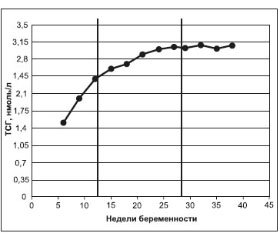Международный эндокринологический журнал 5 (69) 2015
Вернуться к номеру
Physiological changes of the thyroid gland function in pregnancy
Авторы: O. Prylutskyi, S. Hlushych - M. Gorky Donetsk National Medical University, Donetsk, Ukraine
Рубрики: Эндокринология
Разделы: Клинические исследования
Версия для печати
We analyzed last literature data concerning thyroid gland function changes in pregnancy. A number of factors leading to the hormonal changes accompanying metabolic processes change and its increase as well as restructuring of the mother thyroid gland functional state was described.
At first, the stimulating effect of a large number of estrogen increases the thyroxin binding globulin level in pregnancy. The maternal blood triiodothyronine (T3) and tetraiodothyronine (T4) free fraction levels reduce and the level of thyroid stimulating hormone (TSH) increases. It is important to note that according to the available data about a third of women have the thyroid hormones free fraction concentration at the lower limit of normal or below it in case of iodine deficiency.
Secondly, after the implantation trophoblast cells begin to produce human chorionic gonadotropin which activates TSH thyroid follicular cell receptors. The above changes lead to a sharp increase in the thyroid hormones free fraction production. And the feedback mechanisms of the pituitary gland inhibition result in the TSH reduce. However, in some women hCG stimulating effect is more pronounced. It is caused by the individual features of the hCG structure, its secretion imbalance and other factors which may cause mother hyperthyroidism under certain conditions.
Thirdly, increased activity of the deiodination processes affects the rate of the thyroid hormones peripheral metabolism which is mainly carried out through the placenta deiodinase 2 and 3 types. These enzymes increase the rate of degradation and production of thyroid hormones during pregnancy.
Fourth, the increase of plasma volume in pregnant women accompanied by polyplasmia leads to weight and organ gain including the thyroid gland. It is illustrated by color Doppler ultrasound with an increased thyroid blood flow. Thus, hemodynamics changes partially influence the thyroid gland mass gain.
Fifth, there are several factors leading to an increased demand for iodine and its reduce in the mother blood serum. It is well known that the thyroid function quality depends on the adequate iodine levels in pregnant women. Therefore, full thyroid functioning in this period requires plenty of iodine-containing products in the diet or appropriate medication. Following the recommendations of the World Health Organization iodine intake during pregnancy should be not less than 250 mg per day. It is worth noting that in case of insufficient iodine intake decompensation of adaptive mechanisms with formation of goiter and relative gestational hypothyroidism may occur in women.
All these factors cause additional stimulation of the thyroid gland in mother organism. In every pregnant woman changes in the pituitary-thyroid system occur with a certain dynamic that is different for each of the influencing factors and depends on the trimester. These features influence the content of TSH, free T4, and depend on the period of gestation. It must be taken into consideration during the estimation of their values in corresponding periods of pregnancy. Recommended by various organizations reference values were shown. There was a wide variation depending on the individual features and the region. Each laboratory uses its own trimester-specific reference ranges for the determination of TSH, and in assessing the free T4 prefers direct methods of investigation as more objective.
The thyroid gland in mother organism is forced to work hard during pregnancy, so thyroid hormones indicators in pregnant women may be beyond the normal values. The latest data indicated that in 9.7-30% of pregnant women TSH levels may be higher or lower than the trimester-specific ranges.
In time diagnostics of the thyroid function changes severity, maintaining and monitoring the activity of the adaptive processes of the hypothalamic-pituitary-thyroid system in pregnant women is crucial and essential.

